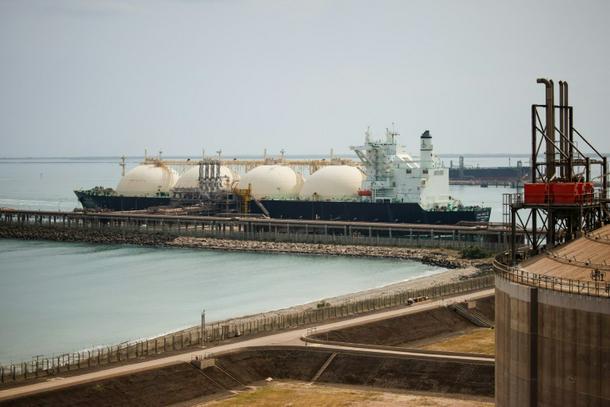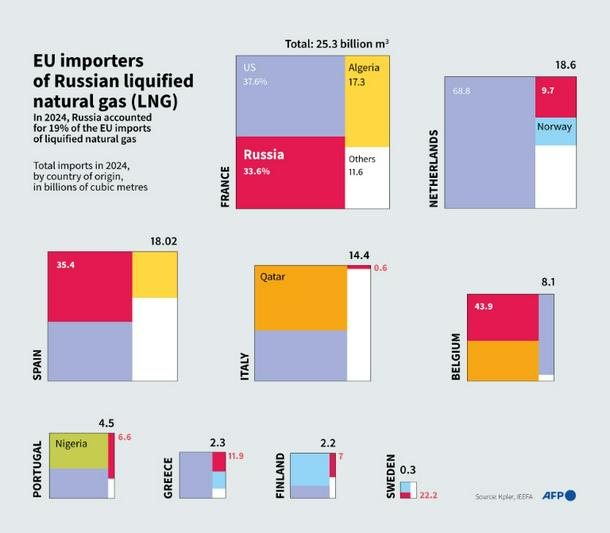
Liquefied natural gas being delivered at the Fos-sur-Mer terminal in southern France, in June 2023
Strasbourg (France) (AFP) - The EU on Tuesday unveiled a long-promised plan to phase out its remaining gas imports from Russia by the end of 2027, breaking a dependency it has struggled to end despite Moscow’s war on Ukraine.
The European Commission’s two-step plan would put an end to new contracts and existing short-term spot contracts with Russian suppliers by the end of 2025, and all remaining imports would be banned by the end of 2027.
“It is now time for Europe to completely cut off its energy ties with an unreliable supplier,” said EU chief Ursula von der Leyen. “Energy that comes to our continent should not pay for a war of aggression against Ukraine.”
The EU enacted a ban on Russian oil in late 2022 in response to President Vladimir Putin’s invasion of the ex-Soviet state, and has since sought to wean itself off Russian gas as well.
Although gas imports via pipeline have fallen sharply, several European countries have increased their purchases of Russian liquefied natural gas (LNG), transported by sea.
Russia supplied 19 percent of the bloc’s gas last year, EU data shows, down from 45 percent before the war.
“We don’t want to be under the control of Putin,” EU energy chief Dan Jorgensen told AFP after setting out the measures at a news conference in Strasbourg.
“We know that he will weaponise energy if he feels that it’s in his interest,” Jorgensen said, noting that the bloc had spent more buying fossil fuels from Russia than on aid to Ukraine since 2022.
The commission’s plan drew immediate fire from Hungary, which has friendly ties with the Kremlin and slammed it as a “serious mistake”.
But the phase-out is politically sensitive beyond Moscow’s allies in Europe – with gas prices already up sharply in recent months, just as the bloc thought it had seen the worst of the energy crisis triggered by the Ukraine war.
To do without Russian energy, the commission has stressed its guiding principle would be “diversification”.
Specifically, phasing out Russian gas would pave the way for Europe to buy more LNG from the United States, something both Brussels and Donald Trump have floated as a way to resolve the standoff sparked after the US president targeted European exports with tariffs.
The United States is already the bloc’s largest LNG supplier, making up 45 percent of the market.
- ‘Much more to do’ -
EU trade chief Maros Sefcovic told The Financial Times that the dispute with Washington could be resolved “very quickly” through additional LNG and soybean purchases – as a way to reduce the 27-country bloc’s trade surplus with its US partner.
Trump in April advanced the figure of $350 billion (309 billion euros) in additional energy purchases – a prospect that has raised hackles in some quarters.
“The Commission risks replacing one disastrous dependency with another – unplugging Putin’s gas and plugging in Trump’s,” warned Greenpeace, which advocates energy savings and renewables as a better path to breaking fossil fuel dependency.
The commission does not need all 27 member states to approve the import bans, which require only the backing from a weighted majority of 15 countries.

Infographic showing European Union member states importing Russian liquified natural gas (LNG) and their other major suppliers for 2024
But even so, EU officials acknowledge that phasing out Russian energy is easier said than done, as some member states are more dependent on Moscow’s LNG than others.
France for example would face a heavier impact from any move away from Russian LNG since it has five terminals for its delivery in Europe.
France increased its Russian LNG imports by 81 percent between 2023 and 2024, giving Russia 2.68 billion euros ($3 billion) in income, according to the Institute for Energy Economics and Financial Analysis.
The commission plan also involves new steps to address Russia’s so-called “shadow fleet” transporting oil despite the Ukraine war sanctions, while additional proposals next month will target Russian imports of enriched uranium and other nuclear materials.